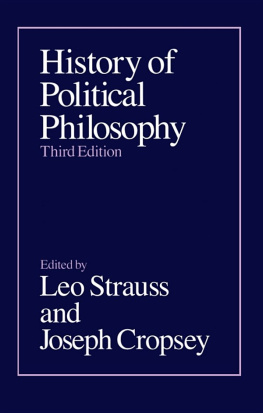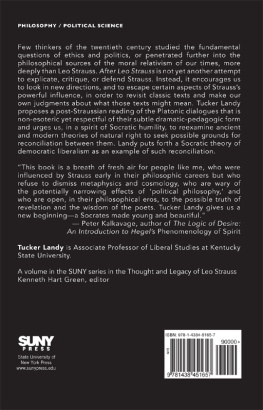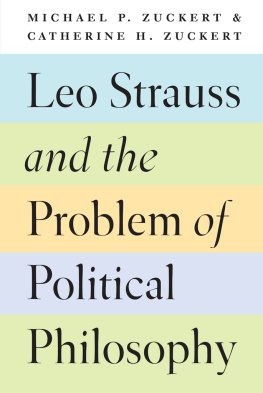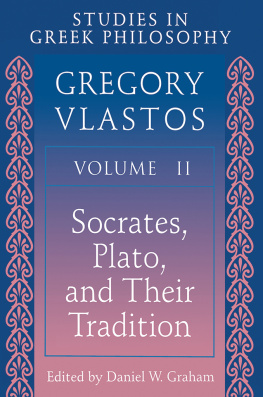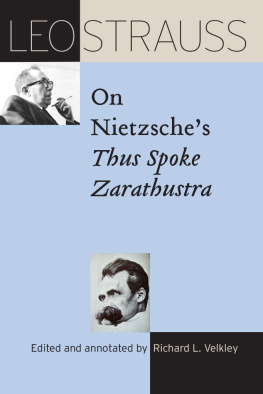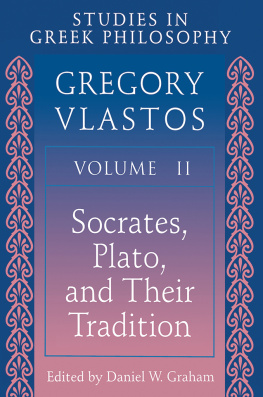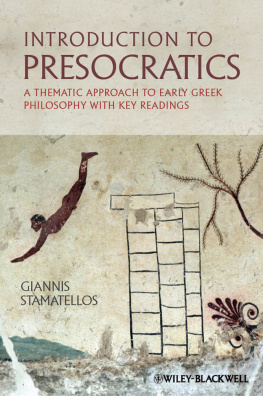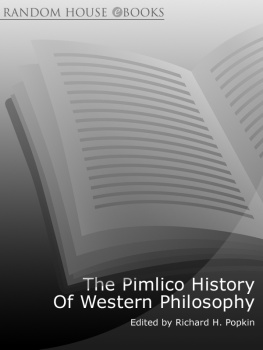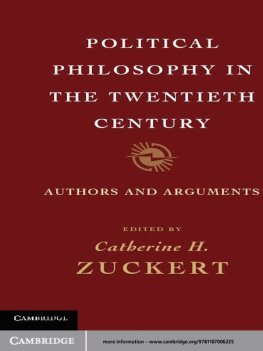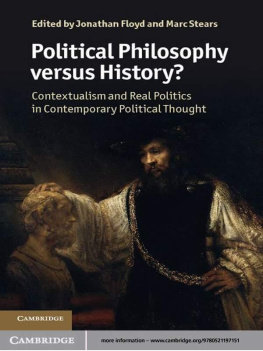Strauss Leo - History of political philosophy
Here you can read online Strauss Leo - History of political philosophy full text of the book (entire story) in english for free. Download pdf and epub, get meaning, cover and reviews about this ebook. City: Chicago, year: 1987, publisher: University Of Chicago Press, genre: Science. Description of the work, (preface) as well as reviews are available. Best literature library LitArk.com created for fans of good reading and offers a wide selection of genres:
Romance novel
Science fiction
Adventure
Detective
Science
History
Home and family
Prose
Art
Politics
Computer
Non-fiction
Religion
Business
Children
Humor
Choose a favorite category and find really read worthwhile books. Enjoy immersion in the world of imagination, feel the emotions of the characters or learn something new for yourself, make an fascinating discovery.
- Book:History of political philosophy
- Author:
- Publisher:University Of Chicago Press
- Genre:
- Year:1987
- City:Chicago
- Rating:5 / 5
- Favourites:Add to favourites
- Your mark:
- 100
- 1
- 2
- 3
- 4
- 5
History of political philosophy: summary, description and annotation
We offer to read an annotation, description, summary or preface (depends on what the author of the book "History of political philosophy" wrote himself). If you haven't found the necessary information about the book — write in the comments, we will try to find it.
History of political philosophy — read online for free the complete book (whole text) full work
Below is the text of the book, divided by pages. System saving the place of the last page read, allows you to conveniently read the book "History of political philosophy" online for free, without having to search again every time where you left off. Put a bookmark, and you can go to the page where you finished reading at any time.
Font size:
Interval:
Bookmark:
The University of Chicago Press, Chicago 60637
The University of Chicago Press, Ltd., London
1963, 1972 by Joseph Cropsey and Miriam Strauss
1987 by The University of Chicago
All rights reserved. Third edition 1987
Printed in the United States of America
04 03 02 01 8 9 10
Library of Congress Cataloging in Publication Data
History of political philosophy.
Includes bibliographies and index.
1. Political scienceHistory.
I. Strauss, Leo. II. Cropsey, Joseph.
JA81.H58 1987 320.01 86-30775
ISBN 0-226-77710-3 (pbk.)
ISBN 978-0-226-92471-7 (e-book)
This book is printed on acid-free paper.
HISTORY OF POLITICAL PHILOSOPHY
Third Edition
EDITED BY
LEO STRAUSS
AND
JOSEPH CROPSEY

THE UNIVERSITY OF CHICAGO PRESS
Chicago and London
PREFACE TO THE THIRD EDITION
The second edition of this work appeared in 1972, the year before the death of Leo Strauss. In the intervening time, a new generation has approached or reached maturity, and the decision to issue a new edition has afforded the opportunity to include their work in this volume, and at the same time to widen the scope of the book in important particulars. Present for the first time are chapters on Thucydides and Xenophon, for which no explanation will be needed. Present also are chapters on Husserl and Heidegger, for which some explanation might be needed; and a statement on Leo Strauss, for which considerable explanation might be needed.
When, in the Preface to the first edition, we referred to the inclusion of chapters on the Muslim and Jewish medievals and on Descartes as open to question, we had in mind of course that the thinkers involved are not primarily political philosophers. Of Husserl and Heidegger the same will be said, as it will be said of phenomenology and existentialism that they are not political philosophy. Yet one has only to think of the 1960s and the radicalism of the times to be reminded of the impact that existentialism however transformed had on a public consciousness. Nor can it be forgotten that Heideggers philosophizing either permitted, prepared, or inducedstill a matter for controversyhis participation, long or short, in a nefarious politics. Perhaps always, perhaps emphatically in our times, politics in some derivative and uncertain way responds to the human contemplation of mankinds powers, horizons, and goals and haltingly gives effect to the emergent visions through the institutions of government. I trust that a knowledge of the work of Husserl and Heidegger will help to deepen a students comprehension not only of the politics of the twentieth century but of political possibilities in principle.
The chapters on Aristotle, on Burke, and on Bentham and James Mill are new to this edition. Replacement was the result either of the withdrawal of the original chapter by its author or of a desire to broaden the authorship of the volume by the inclusion of the work of rising or risen scholars.
The inclusion of the Epilogue on Leo Straussof an essay on one of the editors of the book, withal deceaseddoes indeed demand an explanation. I have called for this addition to the volume because it is now quite clear that Strauss has taken his place as a thinker in the tradition of political philosophy, on a plane not now knowable but of sufficient elevation to have made him interesting and controversial in many places. I am confident that the essay will prove valuable to those who seek a sympathetic, scrupulous presentation of a difficult and widely studied ouvre, a presentation that is not neutral but is nevertheless objective.
I cannot know or claim that any of the decisions that have led to the differences between this and the previous edition would have met with the senior editors approval. I hope that this edition will be received as continuing the intention of those versions that have found favor in the past.
JOSEPH CROPSEY
Chicago, 1986
PREFACE TO THE SECOND EDITION
Continuing interest in the approach to the teaching of political philosophy that is presented in this book has afforded the occasion to publish a second edition. The present text differs from the previous one in containing a chapter on Kant, new chapters on Augustine, Thomas Aquinas, and Machiavelli, and in revision of important details in the chapters on Descartes and Locke. Changes have been made in a few other places, but they are minor.
L.S.
J.C.
PREFACE TO THE FIRST EDITION
This book is intended primarily to introduce undergraduate students of political science to political philosophy. The authors and editors have done their best to take political philosophy seriously, assuming throughout that the teachings of the great political philosophers are important not only historically, as phenomena about which we must learn if we wish to understand societies of the present and the past, but also as phenomena from which we must learn if we wish to understand those societies. We believe that the questions raised by the political philosophers of the past are alive in our own society, if only in the way that questions can be alive which, in the main, are tacitly or unwittingly answered. We have written, further, in the belief that in order to understand any society, to analyze it with any depth, the analyst must himself be exposed to these enduring questions and be swayed by them.
This book is addressed to those who for whatever reason believe that students of political science must have some understanding of the philosophic treatment of the abiding questions; to those who do not believe that political science is scientific as chemistry and physics aresubjects from which their own history is excluded. That the great majority of the profession concurs in the view that the history of political philosophy is a proper part of political science we take to be proved by the very common practice of offering courses on this subject matter.
We tender this book to the public in full awareness that it is not a perfect historical study. It is not even a perfect textbook. It is imperfect of its kind, as we freely acknowledge, because for one thing it is not the work of one hand. If the hand could be found that is moved by a single mind with the necessary grasp of the literature, that hand would write, if it found time, a more coherent, more uniform book, certainly a more comprehensive bookand we will ourselves adopt it when it appears. On the other hand, it must be allowed that the reader of a collaborative work is to some extent compensated for these shortcomings by the variety of viewpoints, talents, and backgrounds that inform the parts of the volume.
We are convinced that even the most excellent textbook could serve only a limited purpose. When a student has mastered the very best secondary account of an authors teaching, he possesses an opinion of that teaching, a hearsay rather than knowledge of it. If the hearsay is accurate, then the student has right opinion; otherwise wrong opinion, but in neither case the knowledge that transcends opinion. We would be under the profoundest possible delusion if we saw nothing paradoxical in inculcating opinion about what is meant to transcend opinion. We do not believe that this textbook or any other can be more than a help or a guide to students who, while they read it, are at the same time emphatically directed to the original texts.
We have had to decide to include certain authors and subjects and to omit others. In doing so we have not meant to prejudge the issue as to what part of political philosophy is alive or deserves to be alive. Surely an argument could be made for the inclusion of Dante, Bodin, Thomas More, and Harrington, and for the exclusion of the Muslim and Jewish medievals and of Descartes, for example. The amount of space devoted to each author could also be questioned, as could our abstaining from the practice of mentioning writers names for the sole purpose of bringing them before the students eye. We will not bore the reader with a repetition of the anthologists prayer for the remission of sins. Everyone knows that there cannot be a book like this without decisions and there cannot be a decision without a question as to its rightness. The most we will assert is that we believe we could defend our deeds.
Next pageFont size:
Interval:
Bookmark:
Similar books «History of political philosophy»
Look at similar books to History of political philosophy. We have selected literature similar in name and meaning in the hope of providing readers with more options to find new, interesting, not yet read works.
Discussion, reviews of the book History of political philosophy and just readers' own opinions. Leave your comments, write what you think about the work, its meaning or the main characters. Specify what exactly you liked and what you didn't like, and why you think so.

